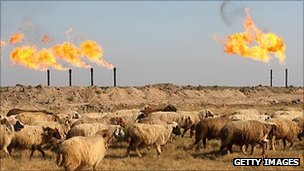
Iraq has agreed to a $17 billion deal covering the next 25 years with Royal Dutch Shell and Mitsubishi to capture the natural gas that is currently being flared off in its southern oil fields. The BBC reports “The new venture will be called Basra Gas Company, with Iraq holding a 51% stake, Royal Dutch Shell’s 44% and Mitsubishi 5%.” Right now, 700 million cubic feet a day are flared, a huge waste due to a lack of infrastructure. Natural gas is commonly burned off in this way as a safety precaution to relieve pressure that might otherwise damage an oil facility.
A memorandum of understanding was inked in September 2008, but some lawmakers demanded parliament OK the arrangement, and in Basra, officials thought their province got short changed. Back-room bargaining seems to have solved the problems. Most of the gas will be burned to generate electricity locally; despite the billions spent on the electrical grid in Iraq, the country still suffers from power shortages.
Iraq’s Oil Minister, Abdul-Karim Elaibi called the deal a “historic turn in Iraq’s oil industry.” Shell CEO Peter Voser told the press Iraq has become a “…substantial part of Royal Dutch Shell’s portfolio in the Middle East.”
To get an idea of how much this is, we can convert it to its oil equivalent. Natural gas is converted to barrels of oil equivalent using a ratio of 5,487 cubic feet of natural gas per one barrel of crude oil. So, 1 million cubic feet of natural gas amounts to 172.3 barrels of crude oil equivalent. Multiply that by 700 and the result is 120,610 barrels of crude oil equivalent daily or 44,022,650 crude oil equivalent per year.
Sinan Salaheddin of the Associated Press wrote recently, “Iraq burns off almost half of the 1.5 billion cubic feet per day of gas that it produces. The deal will help the country capture more than 700 million cubic feet per day of gas from three fields. They are the 17.8 billion-barrel Rumaila field being developed by a BP-CNPC consortium, the 4.1 billion barrel Zubair field, handled by an Eni-led consortium and partners Occidental Petroleum Corp. and KOGAS, as well as the 8.6 billion barrel West Qurna Stage 1, which is being developed by ExxonMobil-Shell consortium.”
The deal is Shell’s third in Iraq since the 2003 US-led invasion, and it will bolster the company’s presence in a country which sits atop 143.1 billion barrels of crude oil and 126.7 trillion cubic feet of gas reserves. It lacks the infrastructure, however, to exploit this as it might.